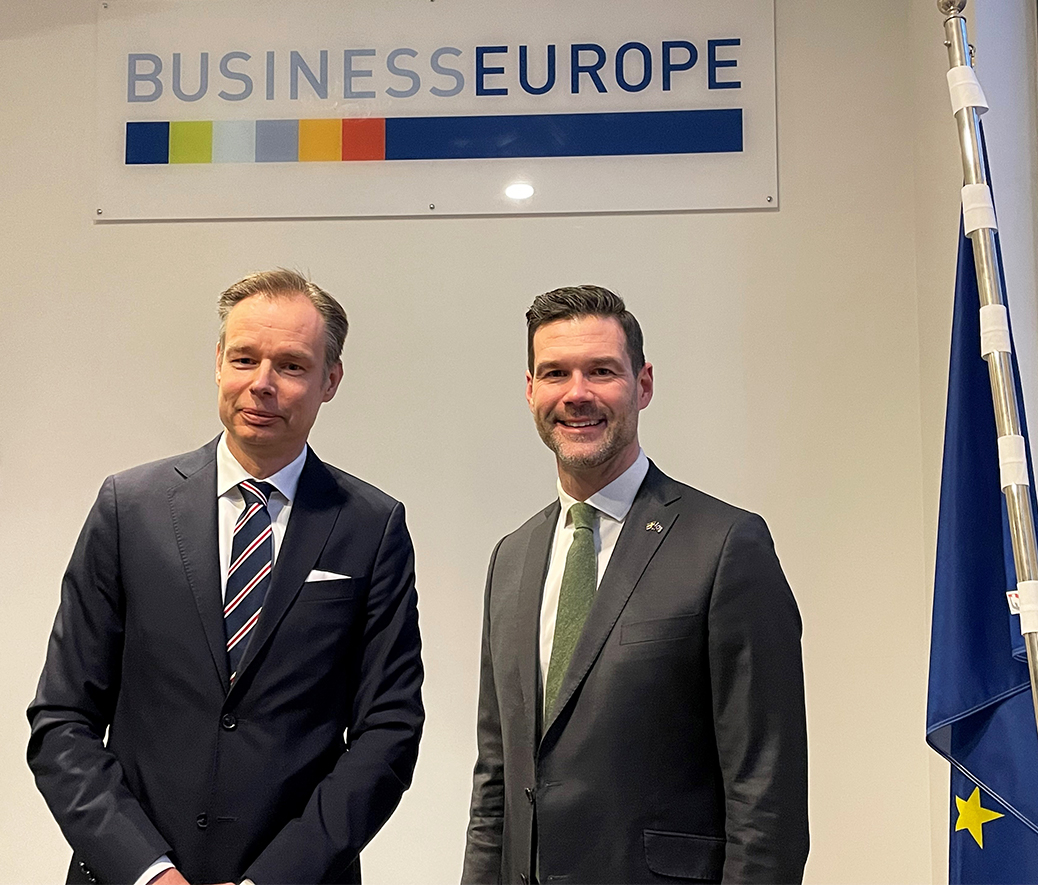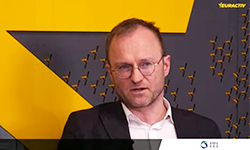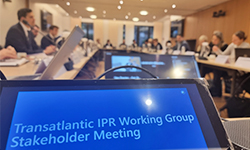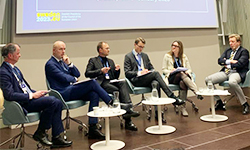BusinessEurope Headlines No. 2023-02
 Ratification of free-trade agreements is a priority for European business
Ratification of free-trade agreements is a priority for European business

“To remain competitive and keep investments in Europe, companies urgently need new export markets and alternative raw material sources. Trade agreements such as the one with Chile for raw materials access and Mercosur for new export opportunities are key”, said BusinessEurope President Fredrik Persson to Johan Forssell, Sweden’s Minister for International Development Cooperation and Foreign Trade, during their meeting on 25 January. Bilateral trade agreements reinforce the EU’s relations with countries that share the same principles of democratic governance, rule of law and market economy, and are the fastest and most effective way to respond to sustainability concerns, ensuring that our trading partners are more ambitious when it comes to respecting human rights, fighting climate change and safeguarding labour standards. “We aim at concluding negotiations with Australia and hopefully with India and Indonesia if conditions are met, but especially we need to work to ensure ratification of the agreements with Chile, Mexico, Mercosur and New Zealand during this institutional cycle”, Persson concluded.
Contact: Eleonora Catella
Transatlantic Data Privacy Framework: impact on business
 “We stress that the new EU-US Data Privacy Framework would not only affect data transfers of technology companies. It has a much wider impact - virtually every business sector and companies of all sizes that have partners on the other side of the Atlantic will stand to benefit from it. Therefore, a robust long-lasting framework will deliver predictability and help businesses in the EU collaborate, innovate, and deliver better services or products for the EU Single Market”, said Martynas Barysas, Director for Internal Market at BusinessEurope, during a high-level conference hosted by the Information Technology Industry Council (ITI) and Euractiv. The European Commissioner for Justice, Didier Reynders, and the Ambassador of the United States of America to the European Union, Mark Gitenstein, were also amongst the speakers at the event.
“We stress that the new EU-US Data Privacy Framework would not only affect data transfers of technology companies. It has a much wider impact - virtually every business sector and companies of all sizes that have partners on the other side of the Atlantic will stand to benefit from it. Therefore, a robust long-lasting framework will deliver predictability and help businesses in the EU collaborate, innovate, and deliver better services or products for the EU Single Market”, said Martynas Barysas, Director for Internal Market at BusinessEurope, during a high-level conference hosted by the Information Technology Industry Council (ITI) and Euractiv. The European Commissioner for Justice, Didier Reynders, and the Ambassador of the United States of America to the European Union, Mark Gitenstein, were also amongst the speakers at the event.
Contact: Svetlana Stoilova
Intellectual property: EU-U.S. stakeholders exchange views with authorities
 European and U.S. stakeholders discussed the impact of artificial intelligence and new emerging technologies on intellectual property (IP) with representatives of the European Commission (DG TRADE) and the U.S. government during the stakeholder session of the Transatlantic Intellectual Property Working Group meeting on 24 January, in Brussels. At the event, which was co-hosted by BusinessEurope, they also discussed how to support smaller businesses and facilitate their access to IP, and how to strengthen the EU-U.S. cooperation and identify opportunities for future cooperation on IP matters. European businesses highlighted the need to increase the efforts to ensure that smaller companies are aware of the benefits that IP could bring to their business journey and that EU and U.S. projects should make sure that these companies are reached out. Pedro Oliveira, Director for Legal Affairs at BusinessEurope and co-chair of the meeting, also stressed that any measure intended to restrict IP, such as compulsory licencing, should be taken with caution and based on sound evidence.
European and U.S. stakeholders discussed the impact of artificial intelligence and new emerging technologies on intellectual property (IP) with representatives of the European Commission (DG TRADE) and the U.S. government during the stakeholder session of the Transatlantic Intellectual Property Working Group meeting on 24 January, in Brussels. At the event, which was co-hosted by BusinessEurope, they also discussed how to support smaller businesses and facilitate their access to IP, and how to strengthen the EU-U.S. cooperation and identify opportunities for future cooperation on IP matters. European businesses highlighted the need to increase the efforts to ensure that smaller companies are aware of the benefits that IP could bring to their business journey and that EU and U.S. projects should make sure that these companies are reached out. Pedro Oliveira, Director for Legal Affairs at BusinessEurope and co-chair of the meeting, also stressed that any measure intended to restrict IP, such as compulsory licencing, should be taken with caution and based on sound evidence.
Contact: Elena Bertolotto
EU due diligence framework statement: how to make it work
 BusinessEurope joined 26 other European business organisations in expressing the recipe for an efficient, realistic and proportionate due diligence framework at EU level. A real (harmonised) level playing field, balanced rules on liability, less disruption on company law systems and further legal clarity were some of the recommendations made. The signatories expressed their openness to working constructively with the EU institutions in this next crucial phase of the legislative process towards workable rules.
BusinessEurope joined 26 other European business organisations in expressing the recipe for an efficient, realistic and proportionate due diligence framework at EU level. A real (harmonised) level playing field, balanced rules on liability, less disruption on company law systems and further legal clarity were some of the recommendations made. The signatories expressed their openness to working constructively with the EU institutions in this next crucial phase of the legislative process towards workable rules.
![]() Contact: Pedro Oliveira
Contact: Pedro Oliveira
Better regulation at the heart of the EU Council Presidency work
 How to deliver rules which are clear, implementable and beneficial to the diversity of our European society? This was the main question discussed by representatives of EU Member States, the European Commission and stakeholders, including business and academia, at the EU Better Regulation Directors and Experts (DEBR) meeting organised by the Swedish Presidency of the Council of the EU in Stockholm on 23-24 January. BusinessEurope was able to share the business community views on how better regulation could deliver on improved competitiveness of the European economy and how some specific regulatory instruments, such as delegated acts, could be improved to ensure legal certainty and unleash the entrepreneurship potential.
How to deliver rules which are clear, implementable and beneficial to the diversity of our European society? This was the main question discussed by representatives of EU Member States, the European Commission and stakeholders, including business and academia, at the EU Better Regulation Directors and Experts (DEBR) meeting organised by the Swedish Presidency of the Council of the EU in Stockholm on 23-24 January. BusinessEurope was able to share the business community views on how better regulation could deliver on improved competitiveness of the European economy and how some specific regulatory instruments, such as delegated acts, could be improved to ensure legal certainty and unleash the entrepreneurship potential.
Another main point discussed was how regulatory frameworks could help boost competitiveness of the EU economy and businesses individually, which is so necessary in turbulent times when Europe is going through one crisis after another.
The panel debate on delegated acts, in turn, highlighted a number of issues to be addressed, requiring a firm commitment not only from the European Commission but also the EU Member States and the European Parliament. Growing complexity and exponential increase in delegated acts over the last years, noted by the researchers of Lund University and others, were a source of growing concern among stakeholders. “In many instances, delegated acts make regulatory frameworks less certain and the business environment less predictable”, said Martynas Barysas, Director for Internal Market at BusinessEurope, referring to our position paper shared with participants. “We need to reverse the tendency of growing complexity and make delegated acts a true integral part of better law-making”, he added.
Participants pointed at the mass of incoming new EU legal acts with delegations to the Commission as one of the sources of such an increase in numbers of delegated acts and flaws in the scrutiny of their content. This puts an immense pressure on the Council and European Parliament to cope with such a tide of new rules. BusinessEurope welcomes the Swedish EU Council Presidency’s attempts to address these tendencies as well as bring their impact on competitiveness of the EU to the table of discussions.
![]() Contact: Martynas Barysas
Contact: Martynas Barysas
Calendar 
- 8 February: BusinessEurope’s SME Roadshow. First stop Helsinki. Are we doing enough for European SMEs?
- 6 June: Reuters Event: Responsible Business Europe 2023
- 14-15 June: International IP Enforcement Summit
- 19-20 June: TDI23 – Day of Industry
Not yet a subscriber? Register here.
Reminder: please have a look at our privacy policy